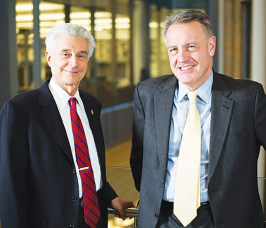It generally takes 10 to 17 years for research discoveries to reach the cancer population, and that’s too long. Partnerships like this are important because they move cancer research more rapidly.— Nicholas J. Petrelli, MD
Tweet this quote
Five years ago, the Helen F. Graham Cancer Center and Research Institute at Christiana Care Health System in Newark, Delaware, and The Wistar Institute, a National Cancer Institute (NCI)-designated biomedical research center, in Philadelphia, Pennsylvania, joined forces to collaborate on translational cancer research to quicken the pace of treatment discoveries and get them into the hands of patients in the community. The partnership has resulted in what Nicholas J. Petrelli, MD, Director of the Center for Translation Cancer Research and Bank of America Endowed Medical Director of the Helen F. Graham Cancer Center and Research Institute, calls a “hybrid-academic community cancer center.”
The partnership is the first inter-institutional collaboration between an NCI-designated basic research cancer center and a community-based hospital system and has already led to bench-to-bedside research trials. “Our accrual rate to NCI clinical trials is between 18% and 22%, which is six to seven times the national average,” revealed Dr. Petrelli. “We have a strong infrastructure for clinical trials research.”
Since our partnership, our community oncologists and basic scientists regularly meet, and the result is that we are collaborating on publishing scientific papers, writing funding grants, and launching clinical trials.— Dario C. Altieri, MD
Tweet this quote
The idea for the joint partnership came out of a conversation in 2011 between Dr. Petrelli and Dario C. Altieri, MD, President and CEO of The Wistar Institute and Director of The Wistar Institute Cancer Center. “I reached out to Dr. Petrelli to see if there were opportunities for two very different organizations, but both with the same unwavering passion and commitment to making an impact in cancer research and oncology care, to work together. And 5 years later, this partnership has turned out to be not just an innovative platform for cooperation and scientific exchange, but a model of care as well,” said Dr. Altieri.
Building on the Aims of the Cancer Moonshot
Since the partnership launched, a biomarker for detecting early-stage lung cancer via a blood sample was discovered by scientists at The Wistar Institute and is now being applied in a statewide lung cancer screening program in Delaware using low-dose computed tomography scans offered by the Graham Cancer Center as part of a research trial. “We are looking for that biomarker in people being screened for lung cancer. Wouldn’t it be great if that biomarker could be used for the early diagnosis of lung cancer?” said Dr. Petrelli.
Another collaborative initiative between the Graham Cancer Center and The Wistar Institute involves the investigation of a targeted therapy for advanced metastatic melanoma. The phase I study is studying the role of myeloid-derived suppressor cells as important regulators of the immune response and promoters of tumor progression in cancer. “In a very short period of time, we have established two mechanisms to move translational research into the community quicker, and that is one of our top priorities here,” Dr. Petrelli added.

Nicholas J. Petrelli, MD (left) and Dario C. Altieri, MD
Both Drs. Petrelli and Altieri agreed that The Wistar Institute–Graham Cancer Center partnership embodies the fundamental concepts in the National Cancer Moonshot Initiative: to accelerate cancer advances and make them available to more patients as well as improve cancer prevention strategies and detect the disease at earlier stages.
“The National Cancer Moonshot program is not going to work unless more partnerships like ours are established,” acknowledged Dr. Petrelli. “It generally takes 10 to 17 years for research discoveries to reach the cancer population, and that’s too long. Partnerships like this are important because they move cancer research more rapidly. It is what all cancer centers should be doing.”
Powerful Proof
“A cornerstone of the Moonshot program is to bring down barriers in scientific research, and I cannot think of a better way to convey that message than by our example of cooperation,” shared Dr. Altieri. “On the Graham Cancer Center side, we have community oncologists providing care to thousands of patients, and on The Wistar Institute side, we have scientific researchers who never see cancer patients.”
He continued, “Since our partnership, our community oncologists and basic scientists regularly meet, and the result is that we are collaborating on publishing scientific papers, writing funding grants, and launching clinical trials. To me, that is powerful proof of what can be accomplished when we all work together.”
Disclosure: Drs. Petrelli and Altieri reported no potential conflicts of interest.

